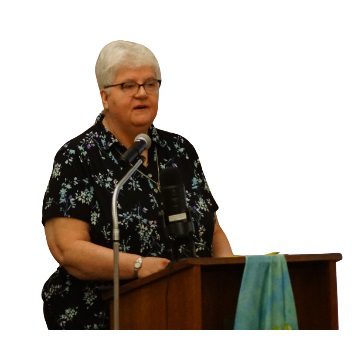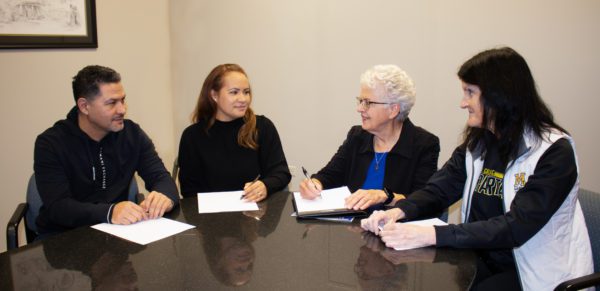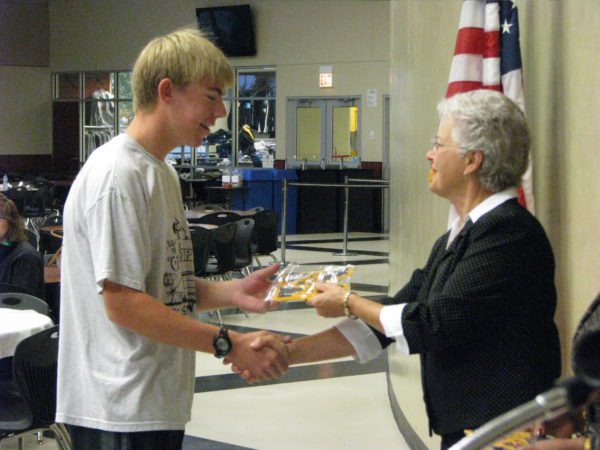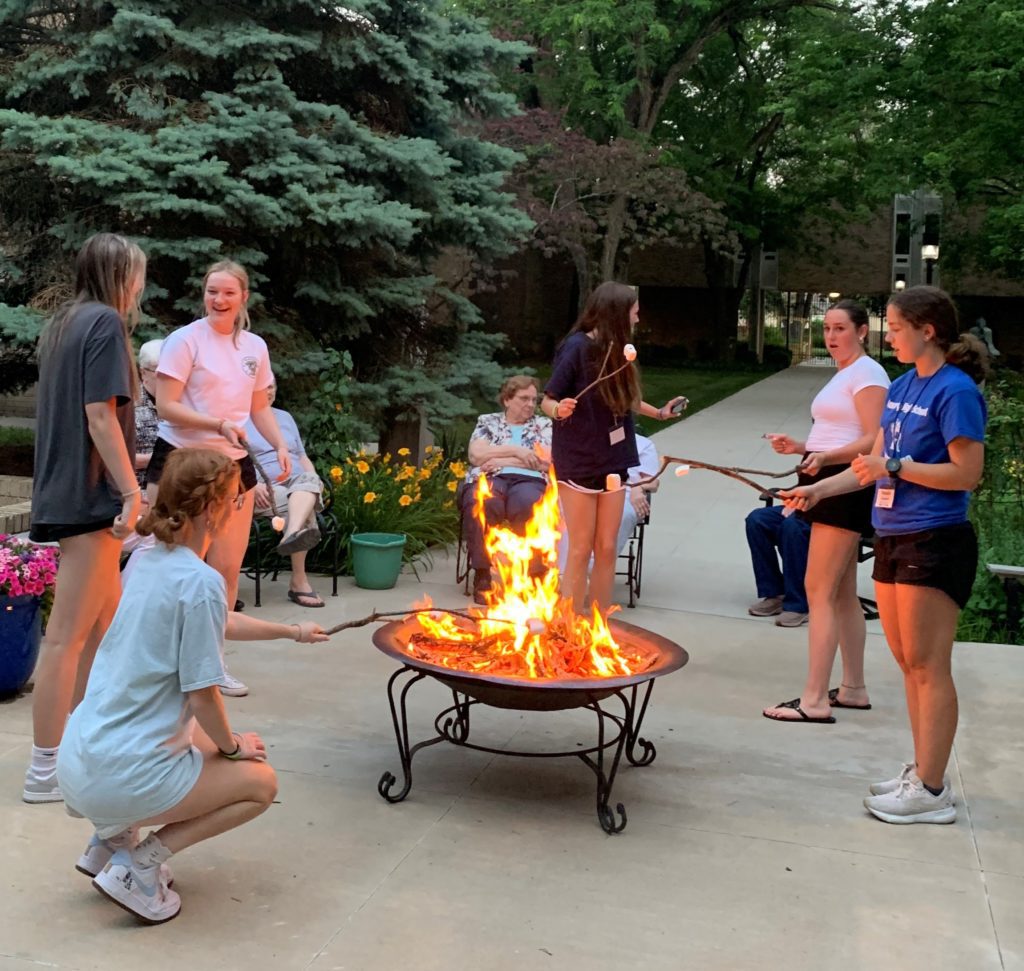The power of a few: Sisters at Marian Catholic are a transforming presence for students, parents
Sister Jean Patrice Schingel has served at Marian Catholic High School, Chicago Heights, Ill., since 1995 as theology teacher, then as department chair, 2005-2019. Since 2020 she has worked in the Bracha Tutoring Center, Marian Catholic’s in-house academic tutoring and support program, with a focus on theology and social science tutoring.
Sister Judine Hilbing was MCHS president 2008-2016, and continues on staff now as the director of scholarships and tuition assistance.
They spoke with JUST Words about what inspires them in their ministry at Marian.
Sister Jean Patrice
JW: 28 years is a long time in high school ministry. What inspires you to continue?
SJP: Students with academic challenges are assigned to the Bracha Tutoring Center where I minister. Kids come every day during their study hall. There are five or six tutors in the center with various areas of expertise. We work with them to help with their homework or get them ready for exams.
Just yesterday a young man who was at our school three years ago stopped by the center to see me. He had a terrible accident on the football field that left him almost paralyzed for a time. He had a hard time academically even before the accident. I worked with him about an hour or two a day through the COVID years, to try to keep him academically above water, but he just couldn’t make it. He left Marian a few credits short of graduation. Yesterday, he came in to let me know he had his GED and had gotten a nice paying job. He told me ‘You kept telling me that I could do this.’ That is what inspires me.
JW: You and Sisters Judine and Karen Kvidera (who also works in the scholarship office) are the only sisters at Marian for the time being.
SJP: That is another reason for me to stay. As long as I can do it I have no problem staying here and doing this ministry because I get to talk to and about God all day and I get to share that with kids. Many of our students are churchless. Anything I can do to touch their lives, help them, gives me deep fulfillment. This year I get to teach a sacraments course to students in an AP research class. It’s been a real pleasure because I am, by nature, a teacher. I find they have a deep desire to understand the sacraments in an integral way, so they can make it their own and enter into the sacraments more prayerfully, which is an incredible blessing.
I’ll share an experience I had with a student whose family is not Catholic and she is not baptized. I didn’t know that. In the middle of class, she was crying while I was talking about baptism. I asked her what was up; she asked ‘Do you think I’m going to hell because I’m not baptized?’ When I asked where that idea came from she said ‘My middle school teacher told me that.’ I said ‘No, you are one of the kindest students in the building. Some people have a baptism of desire—they are just living it. You are that person. Someday you might want to officially get baptized but you are already in sync with God.’
It’s moments like that that help me understand why God keeps me at Marian.
JW: While Marian is a Catholic school, much of the student body is not Catholic. What would you say to those who say it isn’t necessary to provide a Catholic education for non-Catholic students?
SJP: A catholic education, especially one that expresses what ‘small c’ catholicism means—the universality of the Christian message that the baptized are called forth to spread the good news—is the greatest gift the Church gives young people who aren’t Catholic. First, they understand we are all Christians, and second there is a certain social justice tenor to the Catholic Social Teaching that many haven’t been exposed to. If you want good leaders you have to form them. I’m a big advocate that Catholic schools do that.
Sister Judine

JW: How much connection with the students does your role as director of scholarships and tuition assistance afford?
SJ: We have over 500 students that receive tuition assistance and I read every application essay and donor thank you letter every student writes. My real contact is with the parents, and usually while their children are still in 8th grade. My biggest task right now is working with incoming freshman so I’m talking to parents whose kids are still in elementary school as they work through the tuition assistance process.
JW: What is it like to engage in relationship with the parents?
SJ: Many of my most touching experiences involve a parent who dies suddenly. We are extremely attentive to the needs of students who’ve had a parent die. We can’t always offer a full scholarship but we do our best and it is very much appreciated.
This year one girl lost her father to cancer. He was sick for three or four weeks and he died suddenly. The family was super active, and the children high performing students. Her brother graduated from Marian Catholic; she is a senior this year. They were band students, dad was on the crew, big volunteers. He died so suddenly.
There are also so many immigrants. The parents are often undocumented and the children are looking for a way to be successful even though they know their parents are very low income, often day laborers. In these cases, the student and the parent are working together. Often that student is going to become the first to graduate from high school.
JW: What do those stories do for you, personally?
SJ: I am motivated to find funding when I know how deep the desire is, either on the part of the students or parents or both. Every donor that sponsors an endowed scholarship gets a thank you letter from the student. All those communications come through my office. I help keep the donors informed about how much the student appreciates the support, and that encourages donors to continue giving.
JW: Why do you think families choose Marian when there are other options available to them?
Some of our families come, at first, because they want safety and education, then they become very connected to the community. Over time the parents discover that in addition to good education they find a spiritual aspect along with it. It might not be what they come for, but it is why they stay.

JW: How do scholarship donations work?
SJ: About 75% of our students receive some scholarship money. Our tuition is $15,000. Even people with steady jobs can hardly afford that, especially if they have two kids. We have about 60 endowed scholarships. Those donors write a profile of the kind of student they want to support. It is up to us to make the right match. Then we have the Sister Simeon Fund, to which donors, many of them alumni, also give. Whether a scholarship gift is $25 or $50,000, it all goes into the Sister Simeon Fund. Then the committee and I follow the rules and regs and disburse it according to a combination of need and merit.
JW: Looking back on your tenure, what difference has your commitment to Marian meant over the years?
SJ: I am reminded of something Jimmy Carter says: “Just keep doing as much as you can for as long as you can with the resources you have—and don’t stop.” As long as I have the energy I want to keep doing it because I know it is helping the students, I know it is helping the parents, and I think indirectly it is helping the donors, too.


